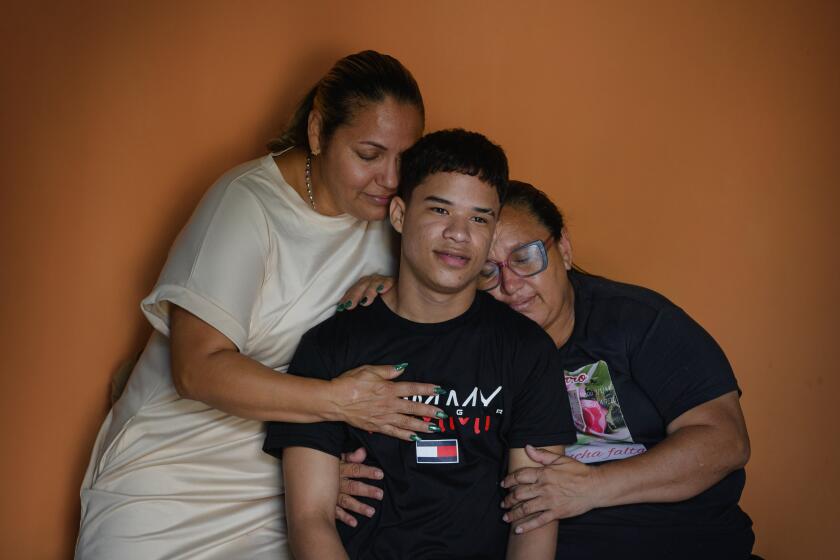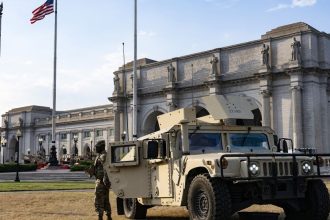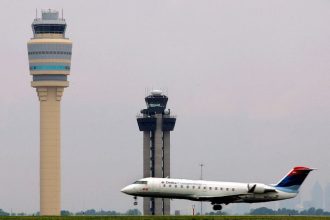In March, President Trump invoked the 1798 Alien Enemies Act to declare Venezuela’s Tren de Aragua gang a foreign terrorist group.
Shortly after, the U.S. sent more than 250 Venezuelans who it said were a part of the gang to El Salvador, where they were jailed for months in one of the country’s most notorious prisons, the Terrorism Confinement Center, also known as CECOT.
Many of the men insist that they have no ties to the gang and were denied due process.
After enduring months in detention, the men were sent home in July as part of a prisoner exchange deal that included Venezuela’s release of several detained Americans.
Venezuela’s attorney general said interviews with the men revealed “systemic torture” in the Salvadoran prison, including daily beatings, rancid food and sexual abuse. The men have been adjusting to life back in Venezuela, which most fled because of their home country’s political and economic instability.
The Times photographed four of the Venezuelans — Arturo Suárez, Angelo Escalona, Frizgeralth Cornejo and Ángelo Bolívar — as they got reacquainted with their families and life outside prison.
Arturo Suárez records a song at a studio in Caracas’ Catia neighborhood. He composed the song in prison in El Salvador.
Arturo Suárez, 34
Suárez, a musician, was detained in North Carolina while gathered with friends to record a music video. Ten people were arrested that day. Inside the Salvadoran prison, he said, music was forbidden and guards beat him repeatedly for singing. But he refused to stay silent. From his cell, he wrote a song that spread from cell to cell, becoming an anthem of hope for the Venezuelans imprisoned with him.
“From Cell 31, God spoke to me,” the lyrics go in part. “He said, son, be patient, your blessing is coming soon…. Let nothing kill your faith, let nothing make you doubt because it won’t be long before you return home.”

Suárez holds a heart he fashioned in prison out of tortillas and toothpaste, with letters made from threads of the white shorts he wore. This tattoo of a bird enabled his family to identify Suárez in videos released by the Salvadoran government.

Suárez checks his phone beneath a poster welcoming him home in Caracas.
I thought I wasn’t going to make it out of there. I thought I was going to die there.

Posters depicting Suárez and other Venezuelan migrants deported to El Salvador are seen in Caracas’ El Valle neighborhood.
Angelo Escalona, 18
Escalona had turned 18 just three months before Immigration and Customs Enforcement agents detained him in the same raid that swept up his friend Suárez, the musician. His dream was to become a DJ, and Escalona had saved up to buy equipment that he showed Suárez just before they were arrested. He had no tattoos, no criminal record and was just at the wrong place at the wrong time, he said.
When the deportation flight landed in El Salvador, he and the other Venezuelans tried to resist being taken off the plane. “We all fastened our seat belts because we’re Venezuelans — we weren’t supposed to be there” in El Salvador, he said. “But the Salvadoran police boarded the plane and started beating the people in the front.”

Angelo Escalona said that the other Venezuelan prisoners called him “El Menor,” or the minor, because at 18 he was the youngest of the deportees.Angelo Escalona, a Venezuelan migrant deported to El Salvador by the United States under an immigration crackdown, poses for a portrait in his aunt’s house, on Wednesday, July 30, 2025 in Valencia, Venezuela. A poster family members held during protests demanding his release says, “Your family has not abandoned you.”A poster the family of Angelo Escalona, a Venezuelan migrant deported to El Salvador by the United States under an immigration crackdown, made during protests to demand his release, on Wednesday, July 30, 2025 in Valencia, Venezuela. Escalona’s aunt displays a poster with a letter his mother wrote to him upon his release. “Son, I love you,” it says in red.The aunt of Angelo Escalona, a Venezuelan migrant deported to El Salvador by the United States under an immigration crackdown, shows a poster with a letter Angelo’s mom wrote to him upon his release, on Wednesday, July 30, 2025 in Valencia, Venezuela.
When we arrived [at the prison], they told us, ‘Welcome to the real hell — no one leaves here unless they’re dead.’

A view of Caracas’ Antímano neighborhood, where Frizgeralth Cornejo lived with his family before traveling north to the United States.
Frizgeralth Cornejo, 26
In mid-2024, Frizgeralth Cornejo made the long trek through the Darién Gap, the dangerous jungle separating Central and South America and made his way north with three friends. Hoping to obtain asylum in the United States, he had applied for an appointment with immigration officials through Customs and Border Protection’s CBP One app.
But when Cornejo, 26, presented himself at the border, officials accused him of gang affiliation because of his tattoos. Everyone else in his group was allowed through, but not him.

Frizgeralth Cornejo has lunch with his mother, Austria, and his brother, Carlos, in Caracas’ Antímano neighborhood. , on Friday, July 25, 2025 in Caracas, Venezuela. Frizgeralth Cornejo, a Venezuelan migrant deported to El Salvador by the United States under an immigration crackdown, walks with his brother, Carlos, in the neighborhood of Sabana Grande in Caracas. , on Friday, July 25, 2025 in Caracas, Venezuela.

Cornejo kisses his mother, Austria.

Frizgeralth Cornejo, a Venezuelan migrant deported to El Salvador by the United States under an immigration crackdown, shows the neck tattoo that allowed his family to identify him in videos released by the Salvadoran government, in Antimano, on Friday, July 25, 2025 in Caracas, Venezuela. Caracas, Venezuela – July 25: Frizgeralth Cornejo, a Venezuelan migrant deported to El Salvador by the United States under an immigration crackdown, shows the tattoo that U.S. authorities claimed this tattoo linked him to the Tren de Aragua gang, in Antimano, on Friday, July 25, 2025 in Caracas, Venezuela.
I never imagined being imprisoned just for getting tattoos.

A view of the neighborhood where the family of Ángelo Bolívar lives in Valencia.
Ángelo Bolívar, 26
Bolívar was living in Texas when he was arrested by ICE agents and sent to El Salvador’s CECOT prison. His many tattoos are part of a family legacy, one he shares with his mother, Silvia Cruz. His late father was a tattoo artist. His tattoos led to his imprisonment, he said, because authorities saw them as proof of membership in the Tren de Aragua gang. He is now back in the city of Valencia, about 80 miles east of Caracas.
They said I was a gang member because of my tattoos — because I had a watch and a rosary. Even though the ICE agents had tattoos of roses and watches too.

Bolívar and his mother, Silvia Cruz, in Valencia.
This story originally appeared in Los Angeles Times.









